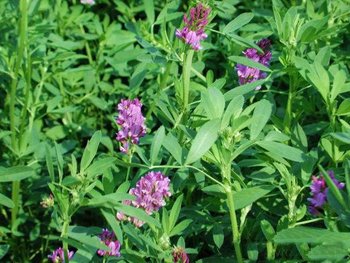
Alfalfa is known as the “Father of all foods” for good reason because It’s loaded with important vitamins, minerals, trace minerals and protein it contains 4g protein for 100g. It’s roots will grow upto 30 feet to pull valuable nutrients from the earth. This plant is commonly used for arthritis, digestive problems and for reducing high cholesterol level. It’s a very inexpensive source of easily digested nutrients. Alfalfa is high in beta-carotene which helps to builds our immune system. This plant also contains chlorophyll which is good for our reducing bad breath and body odor
For example, 1 cup (33 grams) of alfalfa sprouts contains a mere 8 calories. It also contains the following
Vitamin K: 13% of the RDI.
Vitamin C: 5% of the RDI.
Copper: 3% of the RDI.
Manganese: 3% of the RDI.
Folate: 3% of the RDI.
Thiamin: 2% of the RDI.
Riboflavin: 2% of the RDI.
Magnesium: 2% of the RDI.
Iron: 2% of the RDI.

A few small studies have also confirmed the alfalfa benfits on humans.
20 people's are asked to eat 40 grams of alfalfa seeds 3 times per day and results are decreased in total cholesterol by 17% and “bad” LDL cholesterol by 18% after 8 weeks.
And another small study of only 3 volunteers also found that 160 grams of alfalfa seeds per day could decrease total blood cholesterol levels by 3%
This effect is attributed to its high content of saponins, which are plant compounds known to lower cholesterol levels.
They produce this by decreasing the absorption of cholesterol in the gut and increasing the excretion of compounds used to create new cholesterol.
The human studies done so far are too small to be conclusive, but they show promise for alfalfa as a treatment for high cholesterol.
Scientific Name: Medicago sativa
Common Names: Buffalo grass, chilean clover, lucerne
Part Used: Leaves, stems, sprouts
Where it's grown: Alfalfa is native to southwestern Asia and Southeastern Europe. Also grows in North America and North Africa.
